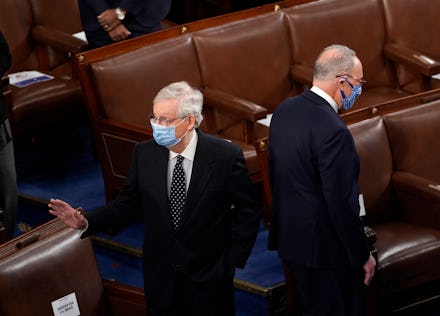Mitch McConnell generously agreed to let Dems control the Senate, after they won control of the Senate

Just a week into President Biden's term and many of the anticipated political moves have already come to pass: The Senate has approved a few of Biden's Cabinet nominees, he's already signed a flurry of executive orders chipping away at his predecessor's legacy, and more progressive Democratic groups are strategizing ways to move Biden left from the center. One thing that probably wasn't expected, though, is the early relent of Senate Minority Leader Mitch McConnell (R-Ky.) on the subject of the much-maligned filibuster.
Less than four weeks ago, McConnell was the majority leader in the upper chamber, meaning that he had immense power and control when it came to executing Trump's agenda and stalling legislation that was important to Democrats. Many expected that the narrow Democratic majority in the Senate might produce a similar result, given the filibuster rule that requires most legislation to pass with 60 votes, rather than a simple majority. With Democrats having only 50 senators in their caucus (plus the tie-breaking vote in Vice President Kamala Harris), it figured that McConnell would attempt to hold on to any semblance of control even with his party in the minority.
But on Monday evening, McConnell told reporters that he would no longer insist that Democrats keep the filibuster rule in exchange for transitioning from Republican to Democratic power in the Senate. (The 50-50 split of senators means that the only reason Democrats are taking power is because of a deal struck in 2001 that the party in the vice presidency gains control, NPR explained.) The filibuster, which former President Barack Obama pointed out is a relic of Jim Crow-era racist politicking, allows one senator to prevent a piece of legislation from coming to a vote; to overcome a filibuster, there needs to be 60 ayes. McConnell is a fan of the filibuster and knows its power well: It was the main tool that he used to disrupt Obama's legislative agenda.
Democrats are celebrating McConnell's cave-in. "We're glad Sen. McConnell threw in the towel and gave up on his ridiculous demand," said Justin Goodman, a spokesman for Majority Leader Chuck Schumer (D-N.Y.) per NPR. "We look forward to organizing the Senate under Democratic control and start getting big, bold things done for the American people."
On the one hand, it seems as if McConnell is ready to share power with Democrats, as he said in a press release. He noted that in the case of a 50-50 Senate split, the power of a vice president to topple that stalemate is only balanced by the power of the filibuster. It needs to be said, though, that McConnell has never really seemed interested in sharing power. In fact, McConnell knows that getting rid of the filibuster requires at least 50 Senate votes — and he also knows that Democrats can't meet that threshold right now despite having 50 senators in their caucus.
That's because moderate Democratic Sens. Joe Manchin (W.Va.) and Kyrsten Sinema (D-Ariz.) have already said that they would not support getting rid of the filibuster. In other words, the two moderate Democrats are allowing McConnell to get what he wants while McConnell himself gets to seem conciliatory.
To be sure, this is the first step in a long four years of what will likely be contentious battles between Republicans and Democrats, let alone the intra-party squabbles that are likely to ensue. To that end, McConnell's move is not exactly a win for Democrats, and it's not exactly a loss for Republicans. If there's one thing we know about McConnell, it's that he's likely playing the long game.